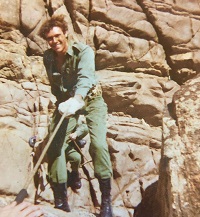Mark Stevens
A history of service
Mark Stevens grew up in a family with a long and proud military heritage. Two grandfathers served at Gallipoli; one representing the Australian Army (who subsequently died on the Western Front) and the other a British Army soldier who survived to migrate to Australia. An uncle also saw action in Papua New Guinea during World War II.
But Mark admits it was probably his father’s general interest in aviation and all things military that sparked his interest in joining the Army Reserve at the tender age of 18. “There was always a lot of military surplus lying around our garage to play with growing up," Mark recalls. "Dad would also take us out to Bankstown Airport as kids and we would climb all over the Marshalls Airways World War II aircraft."
Mark served four years with 12th Psychology Unit (12th Psych) while working in property management. As well as basic training, he mostly helped to test and mark Army applicants, and enjoyed the sense of adventure. He was even considering joining the Army full-time, but in the post-Vietnam War era it was "not the best time to be wearing a uniform" and the family real estate business beckoned.
In the years that followed Mark established his own real estate business, focusing on property redevelopment, management and sales, before a vehicle accident injury prompted a move to Armidale with his young family. He initially worked in a management role for a local newspaper, then moved on to establish a publishing and website development business. All the while, he continued his own tertiary education, online at UNE -first by completing a Bachelor of Organisational Leadership, Graduate Certificate in Arts, and Masters in History. He also achieved a Graduate Certificate in Education Careers at the Australian Catholic University.
"I have always had a strong interest in history, and the Masters allowed me to dip into all kinds of interesting subject areas," Mark says. "From a business perspective, it also enabled me to fine-tune my communications abilities, problem-solving and critical thinking skills, and to learn how to deal with change in a work environment."
In 2006 Mark joined the staff of UNE, as the Business Development Officer, then became Manager of Student Recruitment - a role that again brought him back in step with the military. For the past 12 years he has represented UNE at Defence Transition Seminars across the country, helping to advise defence personnel on the undergraduate and postgraduate courses that might support their promotion ambitions or a transition into civilian life.
"It's one of the most rewarding aspects of my job, enabling someone to start their education journey or to take up postgraduate studies," he says."Defence personal are moving from an institutional environment and looking to redefine who they are, establish new support and social networks, and find new employment.
"They have extensive defence training and skills, and I help to direct them into tertiary education, especially if they meet eligibility criteria for one of our three bachelor programs - the Bachelor of Organisational Leadership, Bachelor of Training and Development, or Bachelor of Business, which give a Warrant Officer Two or above recognition for prior learning. These options help current defence personnel in their career progression and give ex-personnel enhanced career choices and the tools to build a post-defence identity."
US studies show that former defence personnel who take up tertiary study transition far easier into civilian life, and Mark has seen first-hand how study can be life-changing.
"My role requires me to understand the constraints and issues of working in defence, especially when it comes to study," he says. "Having completed several degrees by distance education myself, I can share my personal experiences."
Mark continues his connection with the defence community through his involvement with the local RSL sub-branch and keeping abreast of current issues, and prospective students soon discover he has a wealth of additional career advice to share. "These days we talk about people having multiple careers in their lifetime, and I am a good illustration of that, but the one constant in my life is the path of continual learning," he says. "It has taught me that change is a constant state. What is most important is how we respond, and education gives you the tool sets to deal not only with change but to capitalise on the opportunities it creates."
Interested in Moving Up or Moving on? UNE is here to help. Read More.

